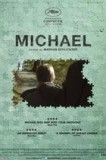| Reviews & Columns |
|
Reviews DVD TV on DVD Blu-ray 4K UHD International DVDs In Theaters Reviews by Studio Video Games Features Collector Series DVDs Easter Egg Database Interviews DVD Talk Radio Feature Articles Columns Anime Talk DVD Savant Horror DVDs The M.O.D. Squad Art House HD Talk Silent DVD
|
DVD Talk Forum |
|
|
| Resources |
|
DVD Price Search Customer Service #'s RCE Info Links |
|
Columns
|
|
|
Michael

Markus Schleinzer's Michael begins with its title character, a small, unassuming man (Michael Fuith), driving his small, unassuming car into the garage of his small, unassuming house. He goes inside, seemingly returning from a run to the grocery store, but when he goes to his basement, we notice that the door is locked--and the inside is soundproofed. That's odd. He then prepares dinner, putting out two place settings, and goes back down to the basement. He unbolts the thick metal bar that blocks the door, opening it to reveal a pitch black room behind. "Come on," he says quietly. Schleinzer holds on that darkness for a good, long while. And then the grave-faced little boy saunters out.
This is Wolfgang (David Rauchenberger). He is ten. He and Michael eat dinner, the thick silence broken only by his request to watch television, which Michael allows before sending Wolfgang down to bed. Michael trudges down later, and closes the door behind him.
Schleizer's compact screenplay gives us very little in the way of exposition; we're not sure how long Wolfgang has been in that basement, but when he makes a letter and picture to send to his parents, the box that Michael stuffs them into is overflowing. The nature of what happens in that basement is thankfully inexplicit as well-- we only see the moments before or after their encounters. But the film is possibly more disturbing precisely because it is not graphic or sensational; Schleizner works in a cold, antiseptic style and with a matter-of-fact approach that is somewhat reminiscent of Michael Haneke's (though it is mostly bereft of that filmmaker's cruelty). What he doesn't show--and thus leaves to our imagination--is much more unnerving than what he does.
The film is shot with tremendous precision and control; Schleizer's mise-en-scène is clean and simple, free of flourishes, his camera seldom moving without purpose (and it's thus more striking when it does, as in a tracking shot through a parking lot that moves with the same definite sense of purpose as the man it shadows). The dialogue is, for the most part, utterly inconsequential, idle chatter with distant co-workers that fills the holes between the trips to the basement. Schleizer's direction is relentless; he doesn't even allow a music score to offer relief from the deadening quiet on screen. This reviewer spent an awful lot of the running time scribbling in the dark, hiding from the uncomfortable events in front of me.
The power of Rauchenberger's work is easy to understate--this is not a showy performance, nor one that indulges many displays of emotion. He has been in that basement for quite some time when we meet him, and his life seems lived in a perpetual state of sad resignation. But a tiny light comes on when Michael takes him to a petting zoo; there's a tenderness to the way he treats those animals that renders him even younger, and thus makes Michael's subsequent actions all the more revolting. And though we're spared the scenes of his abuse, we're not allowed to look away from the child crying in his bed.
Fuith's Michael is an eminently forgettable figure, a cipher with his close-cropped hair, blank face, and dull glasses (without them, he looks oddly similar to Buster on Arrested Development). The startlingly effective actor creates dread in small moments--the weasly giggle he spurts when the child attacks him, or the cold, dead stare he gives at a moment when the boy's life seems in certain danger.
Late in the film, there is a scene where Michael watches, and smirks, at a cliché horror movie on his television, and quotes the poseur-psycho dialogue in the next scene. As an individual moment, it doesn't work (the point is too easy, and too clumsily made), but it positions Michael, consciously or not, in its proper genre classification: this is a horror movie. Not in a traditional sense--there no murders, and not a drop of blood is shed. But Michael is a monster, and in the fine tradition of the New Horror of the 1970s, he is an unexplained one. His mother turns up at the end, but there is no evidence of unhappiness or discord; he has coffee with his sister at one point, and they exchange vague but amicable pleasantries, along with his lies about his girlfriend that she's never met. He was not, as far as we can tell, the product of a broken or abusive home. He's just horrible, a predator, and that is that.
Knowing that, in addition to the general tone and subject matter, you might wonder why on earth you'd want to subject yourself to a film like Michael, and I honestly can't provide you with an answer. It's certainly not enjoyable in any traditional sense of the word, and offers up no comfort either. The best I can do is to mention that a story broke recently about Mark Berndt, a grade school teacher in Los Angeles, who allegedly bound and gagged nearly two dozen of his students, put cockroaches on their faces, fed them his semen, and took photos of it all. There is no motivation for those actions, and there is no motivation for Michael's. But these people exist, and these things happened. If there is a way to explain them, I'm not sure I want to know it.
Jason lives in New York. He holds an MA in Cultural Reporting and Criticism from NYU.
|
| Popular Reviews |
| Sponsored Links |
|
|
| Sponsored Links |
|
|
| Release List | Reviews | Shop | Newsletter | Forum | DVD Giveaways | Blu-Ray | Advertise |
|
Copyright 2024 DVDTalk.com All Rights Reserved. Legal Info, Privacy Policy, Terms of Use,
Manage Preferences,
Your Privacy Choices | |||||||











